 Petzlover
Petzlover Bichon Frise is originated from Spain but Renascence Bulldogge is originated from United States. Bichon Frise may grow 26 cm / 10 inches shorter than Renascence Bulldogge. Bichon Frise may weigh 31 kg / 68 pounds lesser than Renascence Bulldogge. Bichon Frise may live 4 years more than Renascence Bulldogge. Both Bichon Frise and Renascence Bulldogge has almost same litter size. Both Bichon Frise and Renascence Bulldogge requires Low Maintenance.
Bichon Frise is originated from Spain but Renascence Bulldogge is originated from United States. Bichon Frise may grow 26 cm / 10 inches shorter than Renascence Bulldogge. Bichon Frise may weigh 31 kg / 68 pounds lesser than Renascence Bulldogge. Bichon Frise may live 4 years more than Renascence Bulldogge. Both Bichon Frise and Renascence Bulldogge has almost same litter size. Both Bichon Frise and Renascence Bulldogge requires Low Maintenance.
 Contrary to the myths and many of the tales of the history of the Bichon Frise, the breed was originally developed in Spain. Later specific trait development occurred in France to give us the lap dog Bichon Frise that we know today. The original Spanish dog – the Bichon – was a water – sailing dog. It was descended from the poodle breeds crossed with either the water spaniels or the Barbet. These early dogs were friendly and happy and because of this, sailors carried them with them on their ships and even bartered them for supplies. Prior to the 14th century the Spanish probably brought them to the Canary Islands. Later in the 14th century they we discovered again by Italian sailors who returned them to Europe where they lived in the courts of the nobility. During the Renaissance and after the French fell in love with the breed while the Spanish continue to enjoy their presence.
Contrary to the myths and many of the tales of the history of the Bichon Frise, the breed was originally developed in Spain. Later specific trait development occurred in France to give us the lap dog Bichon Frise that we know today. The original Spanish dog – the Bichon – was a water – sailing dog. It was descended from the poodle breeds crossed with either the water spaniels or the Barbet. These early dogs were friendly and happy and because of this, sailors carried them with them on their ships and even bartered them for supplies. Prior to the 14th century the Spanish probably brought them to the Canary Islands. Later in the 14th century they we discovered again by Italian sailors who returned them to Europe where they lived in the courts of the nobility. During the Renaissance and after the French fell in love with the breed while the Spanish continue to enjoy their presence.
In the late 19th century in France the breed fell out of popularity and became street dogs and circus and fair dogs. They also worked with organ grinders and assisted the blind. In the early 20th century, the Societe Centrale Canine, the National Kennel Club of France, adopted the breed’s official standard – while they were still known as both the Bichon and the Tenerife. The popularity of the breed at this time is heavily attributed to “The Adventures of TinTIn” , by Herge, which featured a small, white, fluffy fox terrier. Then the president of the Federation Cynoloqique Internationale presented a new name for the breed based on its characteristics. The name Bichon Frise kept the Bichon heritage and added “curly” the meaning of Frise. Under this name the breed was admitted to the Societe Centrale Canine stud book in October of 1934.
The Bichon Frise came to the United States for the first time in 19554 and was admitted to the American Kennel Club Stud Book in 1972. They entered the non-sporting group of the AKC in 1973. By 2001 the Bichon Frise, J.R., won the Westminster Dog Show. In 1976, the Bichon Frise came to Australia, imported by Harry and Margaret Begg who oversaw the growth of the breed there. Today there are 4 separate breeds believed to be descended from the original Bichon/Tenerife breeds – the Bichon Frise, the Bichon Bolognaise, the Maltese and the Havanese.
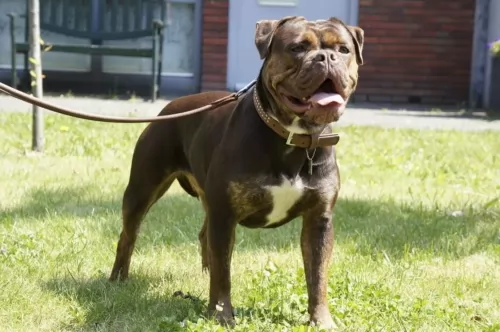 The Renascence Bulldogge, sometimes referred to as the Gargoyle – or Guardian bulldogs, came about by crossing the American Bulldogs with Bullmastiffs, Bandogges, English Bulldogs and Hermes Bulldogges.
The Renascence Bulldogge, sometimes referred to as the Gargoyle – or Guardian bulldogs, came about by crossing the American Bulldogs with Bullmastiffs, Bandogges, English Bulldogs and Hermes Bulldogges.
The idea was to re-create the working British Bulldogge breed of the 1800's. The Renascence Bulldogge is bred to a standard and is a rare dog. The idea was to bring about a dog like the English Bulldog but with less health problems.
There is a Renascence Bulldogge Kennel Club in existence.
 The modern Bichon Frise is a white, small dog with a round skull and muzzle. The nose should be black and the eyes round and dark. Depending on the size of the dog, the legs and head are proportionate to the body, while the tail should be curly and long. Both the tail and the ears must not be docked. Their coat is as hypoallergenic as a dog gets. It is white, dense and for most Bichon Frise, it is curly. They should have black lips as well.
The modern Bichon Frise is a white, small dog with a round skull and muzzle. The nose should be black and the eyes round and dark. Depending on the size of the dog, the legs and head are proportionate to the body, while the tail should be curly and long. Both the tail and the ears must not be docked. Their coat is as hypoallergenic as a dog gets. It is white, dense and for most Bichon Frise, it is curly. They should have black lips as well.
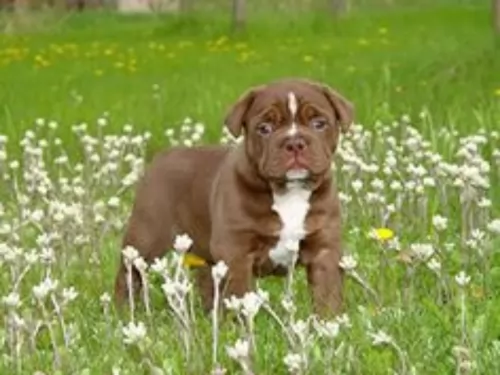 The Renascence Bulldogge is a well proportioned, muscular, medium sized dog with a large head and strong neck.
The Renascence Bulldogge is a well proportioned, muscular, medium sized dog with a large head and strong neck.
He can weigh between 27 to 41 kilograms and stand at between 43 and 56cm. A dock tailed is the preferred look, giving the dog a nice compact, distinguished look, but these days the tail is left to grow long. The coat is short and smooth and the colors are fawn, white and black. The eyes of the dog are low and wide, the muzzle broad and the ears are high set and semi-erect, semi-floppy. The back legs are muscular and heavy, quite a bit longer than the front legs.
Protective and territorial, the Renascence Bulldogge happens to also be a friendly, social, playful dog wih his human family. He tends to be a bit reserved and wary around strangers.
This powerful Molosser is also easy to train, and with training and socialization he becomes a pleasure to have around – obedient and well mannered.
 The Bichon Frise, according to the American Kennel Club is a cheerful and merry dog. They are gentle, playful, sensitive and affectionate. These dogs love people, are very social and like other dogs as well. They love to play with children and they are intelligent and affectionate. They were developed in their latter stages by the French to be “lap dogs” or companion animals. They are not territorial by nature but can become so if confined and encouraged. Start obedience training early and be consistent throughout their lives. They take to training easily if positive techniques are used. They do however, have a reputation for not taking well to housetraining. Be persistent
The Bichon Frise, according to the American Kennel Club is a cheerful and merry dog. They are gentle, playful, sensitive and affectionate. These dogs love people, are very social and like other dogs as well. They love to play with children and they are intelligent and affectionate. They were developed in their latter stages by the French to be “lap dogs” or companion animals. They are not territorial by nature but can become so if confined and encouraged. Start obedience training early and be consistent throughout their lives. They take to training easily if positive techniques are used. They do however, have a reputation for not taking well to housetraining. Be persistent
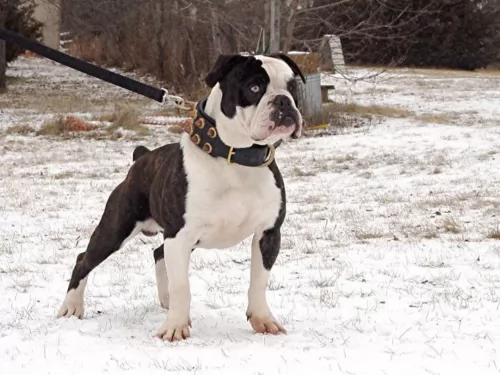 The Renascence Bulldogge is a rare dog and they are now being bred more often by people who love the English Bulldog but who don't want so many health problems.
The Renascence Bulldogge is a rare dog and they are now being bred more often by people who love the English Bulldog but who don't want so many health problems.
The Renaissance Bulldog is a lot more healthier and more robust than the English Bulldog. The best part is that he has the English Bulldog's characteristic look. Bring him into your home and you’ll have an entertaining, social, playful, loving pet and companion.
 The coat of the Bichon Frise can easily become matted if not brushed or combed every day. Severe matting can lead to a hematoma in their ears. They are also very prone to ear infections so paying a lot of attention to their ears is imperative. They are will chew and scratch themselves if not groomed well and this can cause skin infections and conditions. They might have allergies to fleas, pollen, chemicals, and dust. The patella (knee cap) can be loose, diabetes, cataracts and heart disease also affect the Bichon Frise. In the United Kingdom the number one cause of death for the breed is old age -13 plus years, with 21% dying of cancer. In North America cancer is the number one killer as it is for most dogs. The Bichon might also be afflicted with hematologic disorders such as AIHA (Autoimmune hemolytic anemia) and ITP (Immune-mediated thrombocytopenia) which while less common than cancer will kill the dog much earlier in life than cancer. The other condition that the Bichon Frise is prone to are liver shunts. If found early they can be surgically corrected but most are not, and liver failure is eventually the cause of death.
The coat of the Bichon Frise can easily become matted if not brushed or combed every day. Severe matting can lead to a hematoma in their ears. They are also very prone to ear infections so paying a lot of attention to their ears is imperative. They are will chew and scratch themselves if not groomed well and this can cause skin infections and conditions. They might have allergies to fleas, pollen, chemicals, and dust. The patella (knee cap) can be loose, diabetes, cataracts and heart disease also affect the Bichon Frise. In the United Kingdom the number one cause of death for the breed is old age -13 plus years, with 21% dying of cancer. In North America cancer is the number one killer as it is for most dogs. The Bichon might also be afflicted with hematologic disorders such as AIHA (Autoimmune hemolytic anemia) and ITP (Immune-mediated thrombocytopenia) which while less common than cancer will kill the dog much earlier in life than cancer. The other condition that the Bichon Frise is prone to are liver shunts. If found early they can be surgically corrected but most are not, and liver failure is eventually the cause of death.
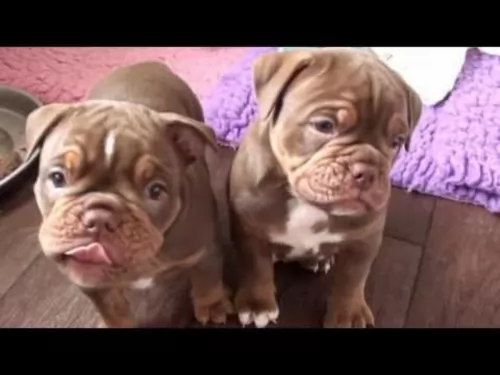 Your Renascence Bulldogge can live to be anything from 10 to 15 years of age with good care.
Your Renascence Bulldogge can live to be anything from 10 to 15 years of age with good care.
Heat stroke is a concern with the Renascence Bulldogge, and even with his daily walk, you will have to keep an eye on him You must never ever leave him alone in a hot car. These dogs have breathing problems as it is and overheating can kill him.Suffering from heatstroke is regarded as an emergency situation.
Any dog can suffer with bloat, not only the Renascence Bulldog. If your dog’s stomach is bloated, he will have a hard, swollen stomach, he will be restless and trying to vomit. This is also a life threatening condition.
Also referred to as canine atopic dermatitis, the Renascence Bulldog sometimes has to contend with this non-parasitic infection. Your poor dog will have dry, itchy skin and he can become frantic with this. You will need to get him to the vet.
Other things to look out for with your Bulldogge are hip dysplasia, cancer and eye infections.
 Being a small dog, the Bichon Frise is susceptible to obesity and that condition will be terminal in the end for this breed. So make sure you do not overfeed your Bichon Frise. The same is true with the use of treats. The Bichon loves treats and loves the association with treats of having pleased you. They should be fed small meals – about ¼ cup of good high quality dry food twice a day.
Being a small dog, the Bichon Frise is susceptible to obesity and that condition will be terminal in the end for this breed. So make sure you do not overfeed your Bichon Frise. The same is true with the use of treats. The Bichon loves treats and loves the association with treats of having pleased you. They should be fed small meals – about ¼ cup of good high quality dry food twice a day.
As previously mentioned the Bichon Frise is susceptible to:
Hematomas and infections of the ear if not groomed well and consistently.
Cancer is number one killer.
Hematological Issues are deadlier than cancer.
Liver shunts are a very serious concern.
Though the Bichon Frise is not an overly active dog, they do love to play. They are characterized by short bursts of activity followed by long periods of rest. They can be worn out just by running around the house. You must play with them everyday as well as take them on a walk each day. Bichons are fast and agile and do well in agility trials. They also like to compete in rally and obedience trials. Most of all they love to and need to play with their people every day.
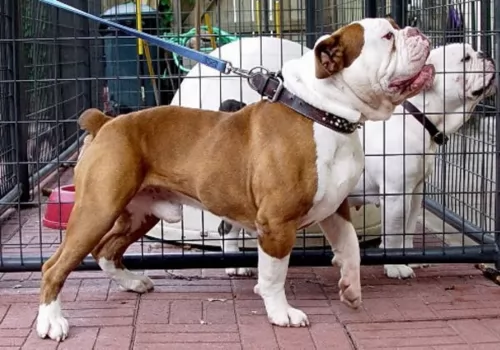 Your Renascence Bulldogge is a special, loving pet, but keeping him healthy can be a bit of a challenge.
Your Renascence Bulldogge is a special, loving pet, but keeping him healthy can be a bit of a challenge.
A walk every day will be a good form of exercise for this dog.
Your pet is one of these dogs that has quite a few layers around the face.You will need to wipe between these folds with a damp,warm cloth or with a natural,gentle anti-fungal wipe.
His skin can become irritated with the layers of skin and you don’t want such a cute pet to battle with a itchy rash on his skin.
Your Renascence Bulldogge is going to need the very best food you can give him. The commercially manufactured foods are nice and convenient and the best ones are well balanced.
It’s nice to be able to give your Bulldogge some delicious home-made food, bearing in mind that dogs like simplicity and consistency.
Boiled chicken, brown rice or pasta and sweet potatoes, spinach and carrots all chopped up and added to your dog’s dry kibble twice a week will delight him. It will ensure he is healthy ad happy. A little bit of raw meat can also do wonders for his health. Never leave him without a constant supply of fresh, cool water.